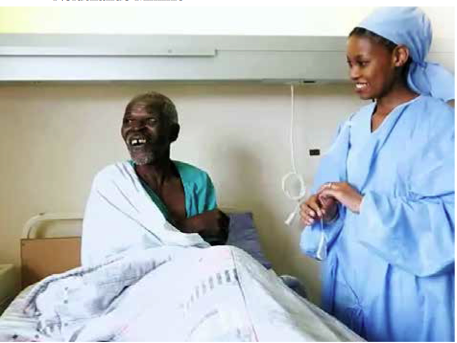Eighty year-old Simon Selepe thought he would never be able to count his pension money when he woke up seeing just darkness one day in 2011.
 Selepe had cataracts in both eyes - a clouding of the lens inside the eye, which leads to a reduction in vision. It is the most common cause of blindness and is treated with surgery.
Selepe had cataracts in both eyes - a clouding of the lens inside the eye, which leads to a reduction in vision. It is the most common cause of blindness and is treated with surgery.
“One day I woke up and everything was dark and my world changed. I could no longer change my clothes without assistance. It was tough.”
He said over the years he had blurred vision but did nothing to treat it.
Selepe had been blind for about two years before he got help from the KwaZulu-Natal Department of Health this year.
During the day when his grandchildren were at school and his sons at work, he would be left alone at home in Nquthu, some 300 kilometres from Durban.
“It was very dangerous to leave him alone. When he needed to go to the toilet he would sometimes walk past it. We would all take turns to look after him,” says Sipho, Simon’s son.
Selepe explains that when it dawned on him that he was blind, he went to the local traditional healer who told him that there was nothing he could do and advised him to see a doctor. He made a trip to the local Nquthu hospital in May and was informed by the doctors that he had cataracts in both eyes.
Sifiso Gwala, an Optometrist and Programme Manager in the KwaZulu-Natal Department of Health in the Umzinyathi District says, Selepe’s case was urgent because both eyes already had cataracts.
“When we found this we had to act quickly as the department and Selepe was operated within 48 hours. He had to be referred to the Dundee Hospital for the surgery. Although there is a huge backlog of patients that need the operation, Selepe’s case was urgent. We operated on the right eye and after six months we will operate on the left eye. This is how the procedure works,” explains Gwala.
Gwala says Umzinyathi Health District, which is under the KwaZulu-Natal Department of Health, had a programme where they visit pension payout points and screen pensioners for cataracts especially in rural areas.
According to KwaZulu-Natal Health MEC Sibongiseni Dhlomo when delivering the health budget vote he said eye care services saw a total of 106 363 eligible clients, of which 32 127 underwent cataract surgeries over the period 2009 to 2013 along with 2 595 glaucoma surgeries completed and a total of 242 136 refraction defects corrected.
The jolly Selepe says he did not believe that he would see again and he was not afraid when he was told that he needed to undergo surgery. “I remember when the doctor shone the light on my eyes and asked if I could see the torch – I could not see anything.”
He said when the doctor had finished operating him, he could not believe that he could see the light.
Sipho said the family was very grateful to the government for assisting his father. “There is help within government departments if you come closer to find the assistance.”
Selepe joked by saying he could now count his own pension money without the assistance of his grandchildren.
Selepe’s operation was made possible by the money that taxpayers pay to the government.
September is also Eye Care Awareness Month.

 Facebook
Facebook Twitter
Twitter WhatsApp
WhatsApp